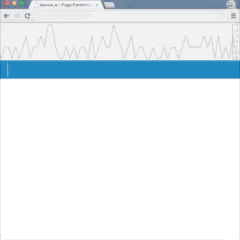benice
v1.0.3
Published
Be nice to host, run "onIdle"
Downloads
13
Maintainers
Readme
Benice - Be nice to your host!
Benice is a tiny set of browser performance estimation tools inspired by Dan Kaminsky's stupidly simple, genius "nice.js". It enables you to "be nice" to your surrounding hosting environment by running your logic only when the browser is estimated idle enough to handle it gracefully, thus reducing "hogging" resources, and slowing down fellow scripts. Benice also provides you with a rudimentary "Monitor" function that reports periodic estimations regarding how "idle" the browser is.
Installation
Benice is UMD compatible, and is available through:
- NPM:
npm install benice - Direct Download (Minified): http://benice.webwise.co.il/benice-min.js
onIdle
If your script is used on a 3rd party site, among many other scripts unknown to you, and you wish to defer your js code execution until the user's browser is relatively "idle", use:
var Benice = require('benice');
var stopWaiting = Benice.onIdle(function(){
// Put your unobtrusive logic here
console.log("Browser's Idle, nice time to show up!");
});To cancel this wait for onIdle, simply call the function returned by `onIdle()':
stopWaiting(); // Wait is canceled, your code will never get executedYou can further tweak onIdle's behaviour using the following parameters:
onIdle(functionToExecute, detectionExpiration, resolutionSamples, sampleInterval, sampleThreshold, arg1, arg2, arg3...)
- functionToExecute - The function to be run when an estimated "idle" state is successfully detected
- detectionExpiration - A time interval (in milliseconds) after which
functionToExecutewill run regardless of a successful detection (defaults to 60000ms) - resolutionSamples - The number of samples requires to establish an "idle" estimation (defaults to 5 samples)
- sampleInterval - The time interval used between samples (defaults to 150ms)
- sampleThreshold - The sample threshold used to assume "idleness" (defaults to 50ms)
- arg1, arg2, arg3... - The arguments to be used when calling
functionToExecute.
For example:
The following call will exhaust detecting for browser idleness after 1 seconds:
onIdle(function(){ console.log('Detection attempt will exhaust in 1 second') }, 1000);This one will require 10 samples to conclude that the browser is actually idle:
onIdle(function(){ console.log('After taking 10 samples, it is safe to estimate that the browser\'s idle') }, 60000, 10);Monitor(functionToExecute, sampleInterval)
Monitor will call functionToExecute every sampleInterval passing it a coarse value ("samples") implying the browser's "idleness" state. 0 means "idle", X value (positive or negative) means X less idle. The simple method of establishing these values is explained in this Dan Kaminsky DEFCON talk.
You can abort a Monitor interval by calling the function it returns:
var stopMonitoring = Monitor(..);
stopMonitoring();
